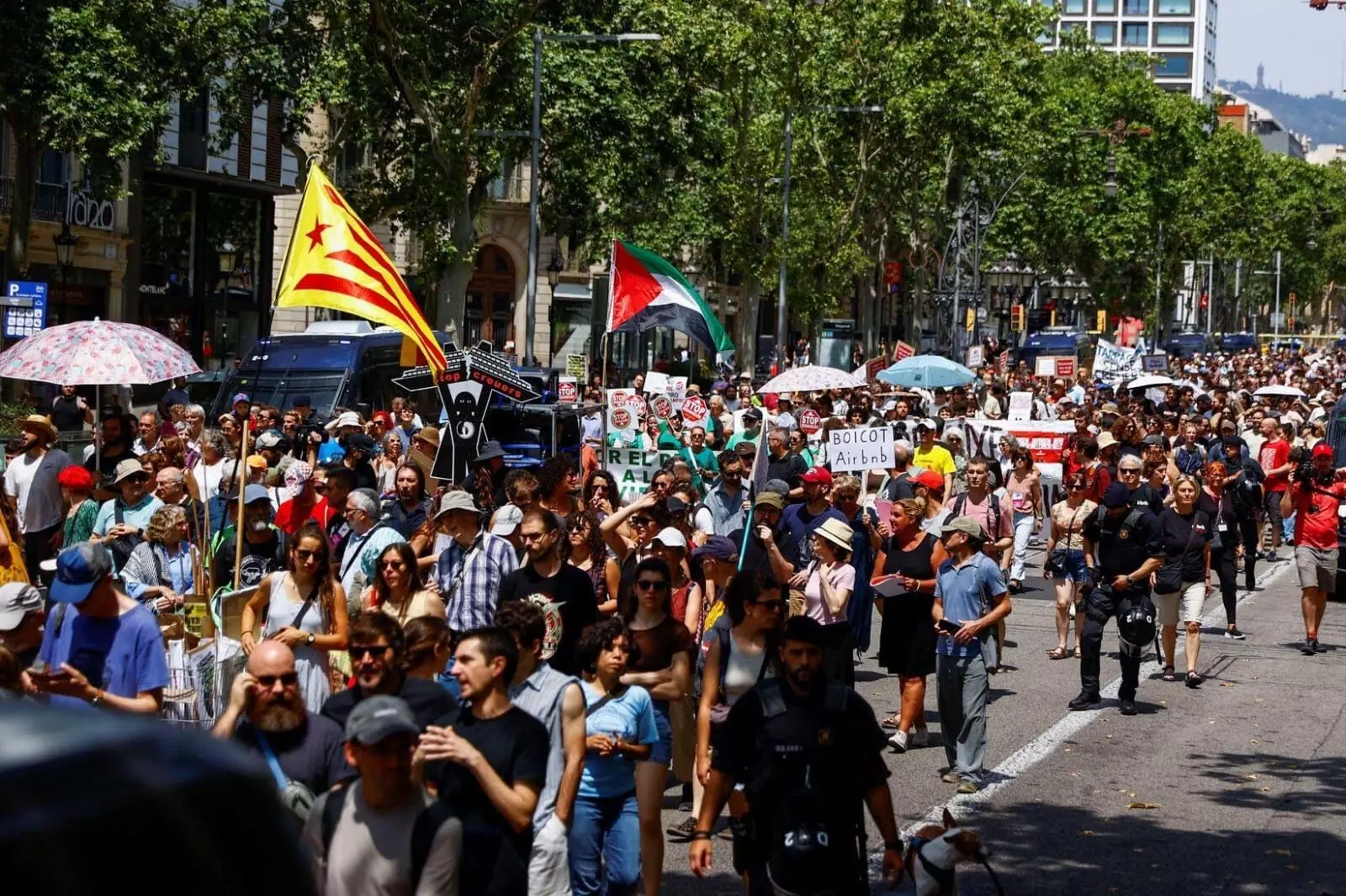Why is Southern Europe up in arms against mass tourism?
These protests reflect a growing backlash against the damaging effects of mass tourism, which many locals say is destroying their cities
By Sri Lakshmi Muttevi
Why is Southern Europe up in arms against mass tourism?
Europe: Protests have swept across southern Europe against uncontrolled, high-volume tourism that overwhelms urban infrastructure, drives up housing costs, and disrupts daily life.
Protesters have taken to the streets chanting, “Your holidays, my misery,” while holding banners bearing stark warnings such as “Mass tourism kills the city” and “Their greed brings us ruin.”
These protests reflect a growing backlash against the damaging effects of mass tourism, which many locals say is destroying their cities, communities, and way of life.
While the protests are not against tourism itself, they are a response to uncontrolled, high-volume tourism that overwhelms urban infrastructure, drives up housing costs, disrupts daily life, and degrades the environment. The demonstrators aim to put pressure on local and national governments to take action and address the negative consequences that tourism is generating across Europe.
Protest actions have included symbolic gestures such as firing water pistols, releasing colored smoke, and placing stickers on shopfronts and hotels that read “Neighbourhood self-defence: Tourists go home.” Demonstrations have erupted in popular tourist hotspots in Spain, including Ibiza, Malaga, Palma de Mallorca, San Sebastian, and Granada, and in Italy, with protests in Genoa, Naples, Palermo, Milan, and Venice. In Venice specifically, opposition has grown against the construction of two new hotels that would add 1,500 additional beds to the already-overburdened city.
According to reports, international travel spending in Europe is projected to increase by 11% in 2025, reaching £617 billion, with Spain and France poised to receive record-breaking numbers of tourists. Spain alone welcomed a staggering 94 million international visitors in 2024, a dramatic rise from the 83 million recorded in 2019.
Why Are Europeans Protesting?
1. Overcrowding and Strain on Infrastructure
Cities like Barcelona, Venice, Amsterdam, and Lisbon are struggling to manage the sheer volume of tourists. Public spaces, transport systems, and essential services are often overwhelmed, leaving residents to navigate daily life in increasingly congested and degraded environments, especially during peak travel seasons.
2. Housing Crisis and Soaring Rents
The explosion of short-term rentals, particularly through platforms like Airbnb, has created severe housing shortages. Landlords now prioritize renting to tourists at higher rates, pushing out local residents and inflating rent prices. In cities like Lisbon and Barcelona, many young people can no longer afford to live in the neighborhoods where they grew up.
3. Environmental Degradation
Mass tourism leads to widespread pollution, including air, water, and noise pollution. It also contributes to the wear and tear on historical sites and the overuse of natural resources. In Venice, for example, large cruise ships have been blamed for damaging the city’s fragile lagoon and undermining its foundations.
4. Cultural Erosion and 'Disneyfication'
Locals feel their cities are being transformed into tourist playgrounds, with traditional culture being sidelined in favor of commercial attractions. Small, essential neighborhood businesses are being replaced by souvenir shops, fast food chains, and generic entertainment offerings designed solely to cater to tourists, leading to the loss of cultural authenticity.
5. Anti-Social Tourist Behavior
In destinations such as Amsterdam and Ibiza, locals frequently report issues with drunken tourists, public urination, vandalism, and rowdy behavior, particularly during the summer months. The disruption caused by such behavior has led to rising frustration among residents, who are forced to deal with the consequences.
6. Economic Inequality and Misallocated Benefits
Although tourism brings significant revenue, the economic benefits often fail to reach local communities. Profits tend to go to large corporations, global hotel chains, and foreign investors, while local residents face the social and environmental costs. The growing disparity between who profits from tourism and who suffers from its effects is a key issue behind the protests.
7. The Pandemic Perspective Shift
During the COVID-19 pandemic, travel restrictions led to a temporary halt in tourism, offering cities a glimpse of life without overcrowding and constant disruption. Many residents rediscovered the tranquility, cleanliness, and community spirit that had been eroded by mass tourism. This period highlighted how significantly tourism had altered urban life and reinforced calls for more sustainable and balanced tourism models.
What Are Protesters Demanding?
Strict limits on cruise ships to reduce pollution and crowding.
Caps on Airbnb and other short-term rentals to prioritize housing for residents.
Introduction or increase of tourist taxes to help fund infrastructure and environmental protection.
Better regulation and long-term urban planning are needed to manage tourism growth.
A shift toward sustainable tourism practices that prioritize quality over quantity, ensuring tourism supports rather than overwhelms local communities.